3 Not-So-Simple Questions, Part IV

Editor’s note: This is the fourth and final part of a feature that began in the pages of the Fall issue of Pittsburgh Quarterly. We invited the heads of the region’s top independent schools to address three important questions, in 200 words or less for each. The final question is below, along with the answers.
With the increasing presence of online education—apparent in online-only schools or so-called hybrid online/brick and mortar schools—do you believe this trend will continue? And what is your school doing to evolve and adapt to this changing landscape?
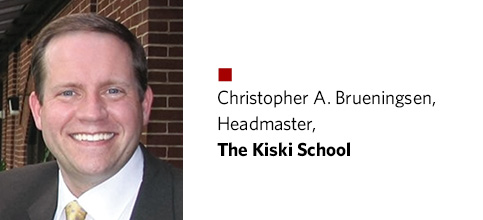
Christopher A. Brueningsen, Headmaster, The Kiski School
The use of online learning in private schools is significantly lower than in public schools. Most private schools have resisted online learning since they believe it doesn’t provide the level of personal attention and care that students and parents have come to expect at their schools. But the use of supplemental online courses is growing in the private sector through partnerships among schools interested in offering advanced and specialized courses. Typically, these classes are taught using web-conferencing software in keeping with the private school philosophy that face-to-face instruction is the best way to learn. Kiski has been on the cutting edge of educational technology for many years, most notably with our one-to-one laptop program that was launched in 1997. As a boys’ school, we know that teenage boys, as a group, are the most active consumers of technology. We’ve worked to leverage this interest by engaging in an online pilot program a few years ago that allowed homeschooled students to participate in traditional classes through videoconferencing. This year, we are working with a consortium of schools in China to deliver real-time math and science classes to middle-school students who are learning English. As the use of technology becomes more seamlessly joined with traditional teaching methods, there will be many more opportunities to thoughtfully explore these new tools in ways that will benefit our students.

Macon Finley, Head, The Ellis School
The ever-expanding array of technology tools available to students and teachers suggest that various forms of online learning will continue to play a role in the future of education. At Ellis, our goal is to continue to refine our curriculum and pedagogy in light of the latest research about how girls learn and develop most effectively. For instance, many Ellis teachers utilize flipped classroom lessons, posting lessons and videos online for girls to study at home, allowing classroom time to be used for the in-depth, hands-on explorations and rich discussions through which girls thrive. Ellis was a founding member of the Online School For Girls (now part of One Schoolhouse), a consortium of more than 80 independent schools committed to offering exceptional classes to supplement on-campus offerings. Almost 20 Ellis teachers from all three divisions have received training from the Online School for Girls to develop areas within their curriculum where blended learning fits best. In addition to the outstanding courses offered on our campus by Ellis faculty, Ellis students can also study with other outstanding independent school teachers in subject areas such as AP Psychology, Forensic Science, and AP Music Theory.
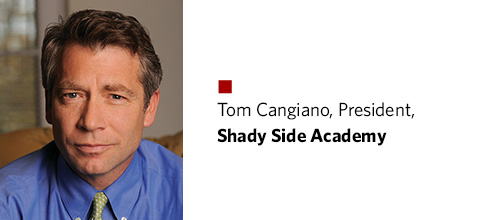
Tom Cangiano, President, Shady Side Academy
Online education is particularly helpful in a few key areas. First, it can permit course options that smaller schools might not be able to offer. In that sense, online options can supplement a strong curriculum. Second, there are online resources, like Kahn Academy, that students sometimes utilize to clarify their understanding of a topic. Finally, online education is a great option for students who aren’t able to flourish in their local school environments. I don’t see online options being utilized in more than a supplementary way at Shady Side Academy, because the in-person classroom experience and the close relationships our teachers establish with our students are essential components of the SSA experience. Online educational options simply cannot provide these kinds of learning experiences.
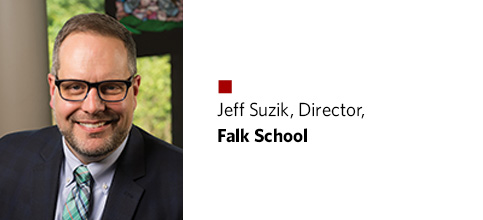
Jeff Suzik, Director, Falk School
Without a doubt, the exponential growth of the Internet in the past two decades has provided both opportunities and challenges for teaching and learning. Not only do students just about everywhere have access to an enormity of information unthinkable to previous generations, learning-oriented apps, online courses, and full-blown online schools have helped to “democratize” learning and extend educational opportunities to larger and larger number of learners. Likewise, through technology, even students in more conventionally structured brick-and-mortar schools have the ability to interact and engage in meaningful discussions and debates that put them in communication with others from across the globe. The Falk curriculum is designed to help students to develop strong technology-oriented skills and competencies so that they might best harness the ever-increasing number of virtual tools at their disposals. At the same time, though, we recognize how vast, scary, lonely (and dangerous, even) the online world can be, especially for children. As a result, we hold firm to our belief that nothing can quite replace the importance of face-to-face communication and collaboration with peers and mentors who know, appreciate, understand, and care for us. At Falk, we believe learning is an inherently social endeavor, and that there is an inestimable value to learning—and living—together, and in real time. Online schooling has yet, it seems, to find ways to get this right, and perhaps never will.

Gary J. Niels, Head of School, Winchester Thurston School
Online learning will always have its place in PreK-12 education. Students come to us not as mere consumers of information, but as creators of content, accustomed to a virtual world, to directing and pacing their own learning. WT’s Director of eLearning integrates online and digital learning thoughtfully. She pilots applications and helps teachers keep pace with their digital native students. And WT is the only school in Pennsylvania in the Malone Schools Online Network (MSON), providing students with online courses at independent schools around the nation. A purely online education cannot meet all learning needs. As tech has advanced, so has learning research. We must employ various methods to engage children and adolescents physically, socially, intellectually; we must challenge them to apply skills and knowledge, develop ideas, design solutions, and produce credible work. The student-teacher relationship remains pivotal in this process. For example, in computer science, WT uses online, digital, and hands-on approaches to teach algorithmic thinking and coding in several languages. Then, we integrate this learning with engineering, robotics, the arts, humanities, and mathematics and guide students to solve real world problems. Undoubtedly, WT’s technology integration will evolve as technology evolves, and as students and teachers change in response. The only question is pace of change.
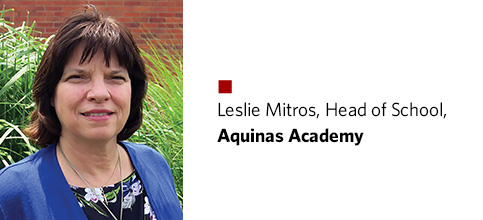
Leslie Mitros, Head of School, Aquinas Academy
Online education is part of the landscape in this century. There are opportunities that are available for growth for both students and faculty through online courses and webinars. While those opportunities broaden the educational choices, they do not always provide the depth of learning that can and should happen through classroom interaction. Education is more than mere instruction. Many students who have participated in online education realize the advantages, but also recognize the drawbacks. Occasionally, a student has enrolled in an online course that is not part of our traditional curriculum, expanding their opportunities. But the most valuable learning experiences for students come from personal interactions with teachers and classmates. The outstanding formation that students receive at Aquinas Academy cannot possibly be replicated through an online curriculum.
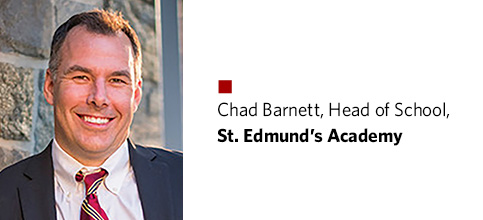
Chad Barnett, Head of School, St. Edmund’s Academy
While we believe that online learning provides uniquely customized opportunities for enrichment and remediation, we want that learning to happen in the context of relationships. Children experience the greatest cognitive gains when they feel connected and engaged, safe and supported. We feel deeply suspicious that this sense of emotional wellbeing can develop alone, in front of a computer screen. From my perspective, this is a transformational moment in educational policy and practice where rapidly evolving cultural change associated with globalization and made possible through networks has created a renewed sense of urgency around how young people perceive themselves and each other. Preceding the appraisal of what forms of online learning work, we remind ourselves of the transformational power of networks generally and the profound influence they have over our children’s relationship with the world around them. Guided by our core values and commitment to academic rigor, St. Edmund’s Academy students will develop a clear sense of their place in an increasingly interconnected world—using powerful communication tools to advance their learning in positive relationships with others. More importantly, they will come to see how their decency and integrity might make that interconnected world even better.

Justin Zimmerman, Headmaster, The Linsly School
Online education is expanding in many areas of education, and offers students and families many different alternatives to more traditional options. We believe we will begin to see even more personalized online learning experiences developed in the future. Online programs are able to personalize learning in a way schools have never done before, and this will result in more self-directed and personalized learning experiences. However, initial research indicates that online learning may not be as effective as face-to-face learning, and therefore, we believe brick and mortar schools are hear to stay, especially for younger students who need more guidance and attention during the learning process. At Linsly, teachers use technology to personalize the learning experience for students. Teachers frequently incorporate apps and programs to help students learn at their own pace and with increasing levels of difficulty. In addition, Linsly is beginning to incorporate online classes in areas of more advanced study, and for students who have the maturity and intrinsic motivation to explore areas of study above and beyond the core curriculum. For example, this year students have the opportunity to take Anatomy and Computer Programing online. With online classes we are able to offer more scheduling flexibility, more specialized courses, and help students explore different areas of interest.
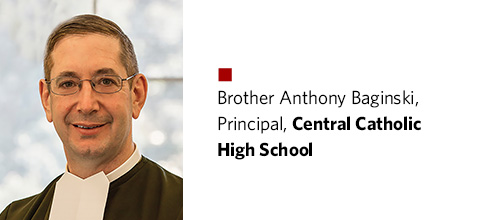
Brother Anthony Baginski, Principal, Central Catholic High School
The information age provides students with unprecedented access to knowledge, connects people across the globe and introduces different modalities of education. Central Catholic High School promotes a culture of learning and welcomes the technological innovations that put educational resources at the students’ finger tips. Our 1:1 iPad program, flipped learning, and increased communication between teachers and students are examples of the positive impact technology has on the learning environment. However, I believe that at its core, education is a human endeavor where the interactions between students and teachers and the behaviors modeled are an invaluable part of high school. The performing arts, seminars, and group study sessions work because of this. Central Catholic’s state of the art STEM center with fully equipped science labs, engineering and design spaces and a tech shop where students prototype their designs using 3D printers, CNC milling machines, and welders provide the necessary group collaboration and hands-on learning that is prized in today’s high-tech world. Online courses need to be evaluated and incorporated into the curriculum as part of an educational philosophy. As the landscape of education continues to change, Central Catholic is committed to embracing what is beneficial to the learning environment.



